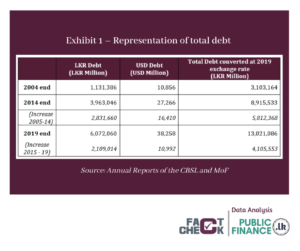Fact Check
The main claim is that Sri Lanka’s debt rose much faster over the five-year period from 2015-2019 than over the 10-year period prior to that.
To check the figures cited by the minister, FactCheck.lk consulted data presented in the annual reports of the Central Bank (CBSL), the annual reports of the Ministry of Finance (MoF) for 2004 – 2020, and Verité Research’s Insight “Demystifying increase in Sri Lanka’s debt”, which sets out the methodology for calculating debt increase between two periods.
Figures cited by the minister convert to the following: from 2005 to end 2014, the debt level of the country rose at an annualised growth rate of 13.3%; and from 2015-2019 it increased at a marginally lower annualised growth rate of 13.2%. In addition to his claim being contradicted by the minister’s own figures, the figures he uses are also not methodologically appropriate for the comparison being attempted. (See: Verité Research Insight “Demystifying increase in Sri Lanka’s debt”)
Since debt is taken in local and foreign currency, to calculate the increase correctly, it is necessary to specify the increase separately in local and foreign currency and then convert that increase into an LKR or USD amount at the exchange rate relevant to the date of comparison. Based on the minister’s statement, Exhibit 1 sets out the figures with end 2019 as the date of comparison.
Exhibit 1 shows the increase in debt from 2005 to 2014 was equal to LKR 5,812,368 million or USD 32,000 million, when converted in 2019; as against LKR 4,105,553 million or USD 22,603 million in 2015 to 2019. Therefore, contrary to the minister’s figures, in absolute terms as well, the growth in debt was larger during 2005 to 2014 than in 2015 to 2019. (N.B. 2005 to 2014 is also a longer period).
The correct annualised growth rate in debt is also, therefore, much higher from 2005 to 2014. It was at 11.13%; as against 7.87% for 2015-2019.
The minister’s main claim is flawed on two grounds: First, his own figures don’t support his claim. Second the figures are also flawed for the purpose of the comparison. The corrected numbers show that both in absolute and relative terms Sri Lanka’s debt grew less in the 2015-2019 period than in the 2004-2014 period.
Therefore, we classify the minister’s statement as FALSE.
**FactCheck.lk’s verdict is based on the most recent information that is publicly accessible. As with every fact check, if new information becomes available, FactCheck.lk will revisit the assessment.

Sources
Various editions of the Annual Report of the Central Bank of Sri Lanka from 2004 – 2020
Various editions of the Annual Report of the Ministry of Finance Sri Lanka from 2004 – 2020
Demystifying increase in Sri Lanka’s debt by Verité Research available at; https://www.dailymirror.lk/other/Demystifying-increase-in-Sri-Lankas-debt/117-226501 [Last accessed 19th January 2022]


